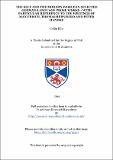Files in this item
The self and the modern world in selected German-language prose works : with particular reference to the writings of Max Frisch, Thomas Bernhard and Peter Handke
Item metadata
| dc.contributor.author | Ellis, Colin | |
| dc.coverage.spatial | xiii, 248 p. | en_US |
| dc.date.accessioned | 2018-05-18T13:53:51Z | |
| dc.date.available | 2018-05-18T13:53:51Z | |
| dc.date.issued | 1994-07 | |
| dc.identifier.uri | https://hdl.handle.net/10023/13397 | |
| dc.description.abstract | The self and its confrontation with a specifically "modern" world is viewed as a dominant theme of much German-language prose writing in the period 1945-1989. Chapter One considers factors giving rise to this preoccupation, their reflection in key literary works of the 1940s and 1950s, and literary and cultural changes in the 1960s. Frisch, Bernhard and Handke are introduced in the context of the period leading up to 1968, a year which is both the historical mid-point of this era and a symbol of the personal revolt crucial to each writer's development. The three subsequent chapters examine (respectively) the writings of Frisch, Bernhard and Handke, in each case concentrating on a series of works in which the vulnerable self struggles to survive in the face of a modern world frequently portrayed as alien, uncontrollable and destructive ; Frisch's three major novels Stiller. Homo faber, and Mein Name sei Gantenbein. Bernhard's five volumes of autobiography, and Handke's tetralogy Langsame Heimkehr all illustrate the theme of re-evaluation of the self by being turning-points in each writer's career. Chapter Five considers related tendencies in German literature after 1968; the "new subjectivity" of the 1970s, the debates generated by the rise of postmodernism and the dominance of mass media and popular culture in the 1980s. The sometimes puzzling forms assumed by German writing in this period are seen as reflecting a cultural and psychological unease, the portrayal of often harrowing inner experiences in the work of Frisch, Bernhard and Handke in particular demonstrating the awareness of an "other side". In their writings, the combination of historical and intensely personal elements creates a response in the reader which can stimulate his/her own self-scrutiny and personal re-evaluation, and lead to a kind of self-knowledge similar to that gained by the autobiographically-tinged central figures. | en_US |
| dc.language.iso | en | en_US |
| dc.publisher | University of St Andrews | |
| dc.subject.lcc | PT735.E6 | en |
| dc.subject.lcsh | German fiction--History and criticism. German prose literature--20th century--History and criticism. | en |
| dc.title | The self and the modern world in selected German-language prose works : with particular reference to the writings of Max Frisch, Thomas Bernhard and Peter Handke | en_US |
| dc.type | Thesis | en_US |
| dc.type.qualificationlevel | Masters | en_US |
| dc.type.qualificationname | MPhil Master of Philosophy | en_US |
| dc.publisher.institution | The University of St Andrews | en_US |
This item appears in the following Collection(s)
Items in the St Andrews Research Repository are protected by copyright, with all rights reserved, unless otherwise indicated.

